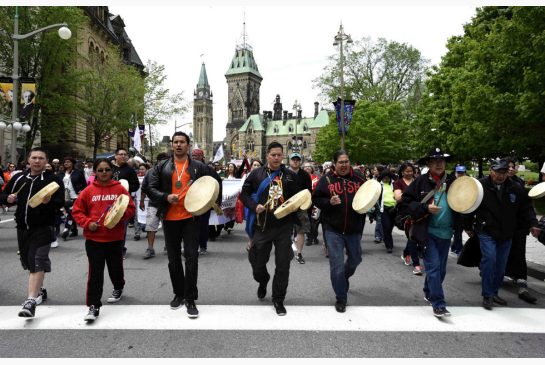Truth and Reconciliation Commission Inspired Pride and Anger
By Steve Bonspiel
As the Truth and Reconciliation Commission wraps up its five-year mandate this week in Ottawa, I am both proud of the heroes who testified and disappointed in a country that is failing them all over again. The commission attempted to give some form of healing to those who suffered the most in residential schools, but in a few important ways it fell short. TRC Justice Murray Sinclair pointed to 2008’s residential school apology in the House of Commons as hollow words. He was right. With unconstitutional bills like Bill C-51 (the anti-terror bill), land claims moving at a snail’s pace, and many of our communities without proper infrastructure, sewage and running water, Native people have all but given up on healing with Stephen Harper as leader. And then there was the commission itself. Many who attended the events (myself included) came away with mixed emotions. There was sadness, of course, but also quite a bit of anger that wasn’t only directed toward the priests and nuns who routinely sexually, physically and mentally abused the children. I came away from it angry at the process. As a Mohawk who grew up with politics, pride and the strong will to fight for my rights (I was 14 during the 1990 Oka Crisis) I felt a lot more could have been done to help facilitate true healing. The brave souls who testified were scared little children when they were snatched from their homes. Most were beaten when they spoke the only language they knew, were forcefully cut off from their way of life and their families; and were made to feel like dirt merely because they were “Indian.” So when they were asked, according to the commission’s rules, not to name names or point fingers at their abusers, it felt like our heroic residential school survivors were forced to shut up once again. But this time they were speaking English. Far too many of them lost their language forever, saw it ferociously eradicated by the residential schools. As a journalist I know full well the implications of sullying the names of people who haven’t been charged with a crime, but given the scope of the historic commission, the magnitude of the residential school shame, and the opportunity presented at these events across the country, these pedophiles deserved to have their names thrown out there for everyone to hear. Quebec’s Charbonneau Commission, a public probe into construction site corruption, saw hundreds of people’s names mentioned as shady or crooked, yet very few have been charged. Much of the gritty details were front-page news for months on end. Double standard? But the commission at least promises to prompt a much-needed conversation. Supreme Court Justice Beverley McLachlin said last week Canada committed cultural genocide. We need more high-profile Canadians to speak up and stand behind what really happened. We can no longer brush the crimes of residential schools under the rug. We must teach this in every school, ensure the next generation understands what happened, and never let society forget. The commission visited 300 communities and heard from 6,750 survivors and they were appalled, flabbergasted and disgusted with what they learned. We must never forget that thousands of children perished at these schools thanks to foreign diseases, twisted experiments and malnutrition. Some were murdered outright. We must not forget that most of the children who died were not even acknowledged, let alone afforded the respect of proper burial in their own communities. The crime of killing thousands of innocent children has, until this very day, gone unpunished on a mind-bogglingly massive scale. The summary of the TRC report released on Tuesday contained strong words that everyone in this country ought to reflect on if we are truly to move forward, to achieve some level of true reconciliation. “In 2015, as the Truth and Reconciliation Commission of Canada wraps up its work, the country has a rare second chance to seize a lost opportunity for reconciliation,” said the report, referring to 1996’s largely ignored Report of the Royal Commission on Aboriginal Peoples. “The urgent need for reconciliation runs deep in Canada. Expanding public dialogue and action on reconciliation beyond residential schools will be critical in the coming years.” Indeed it will be. Critical to true healing. Critical to a real, lasting recognition of what happened in those terrible, lonely places they called schools. The Canadian government was complicit in these crimes against helpless children who just wanted to do what they were told. Now it’s Ottawa’s turn to listen to the adults.
|
.
Any original material on these pages is copyright © BishopAccountability.org 2004. Reproduce freely with attribution.
